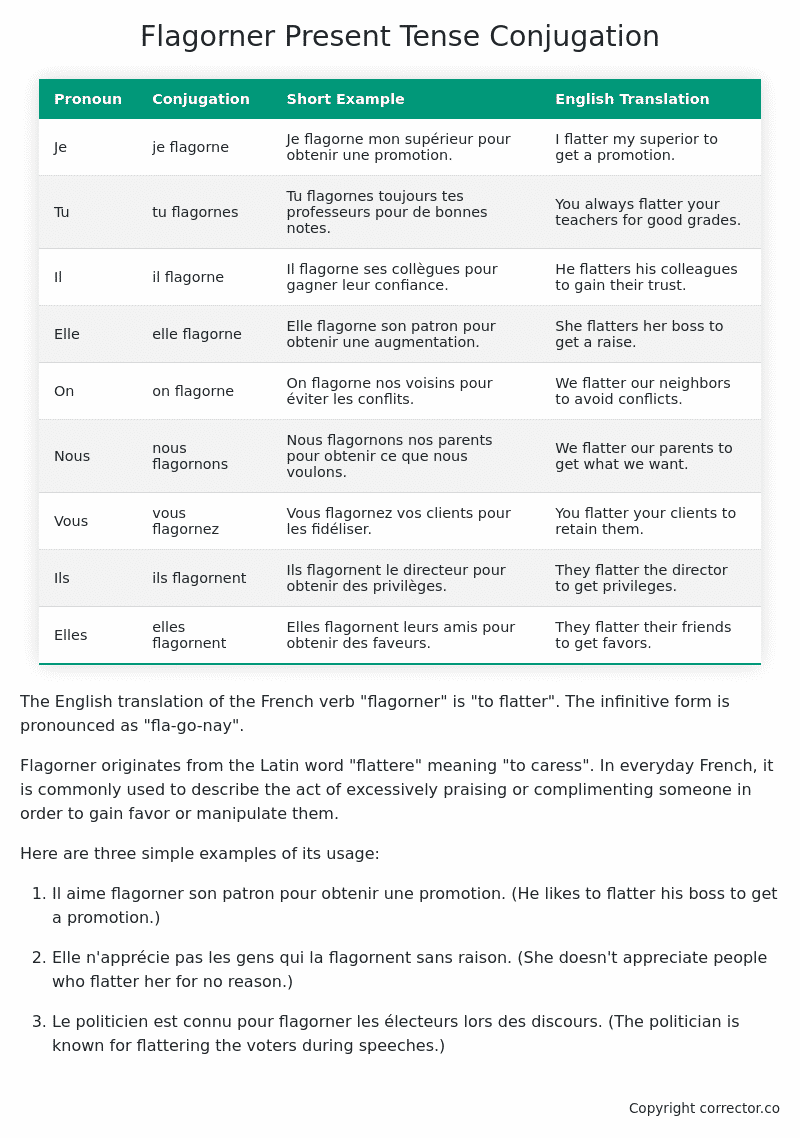Le Present (Present Tense) Conjugation of the French Verb flagorner
Introduction to the verb flagorner
The English translation of the French verb “flagorner” is “to flatter”. The infinitive form is pronounced as “fla-go-nay”.
Flagorner originates from the Latin word “flattere” meaning “to caress”. In everyday French, it is commonly used to describe the act of excessively praising or complimenting someone in order to gain favor or manipulate them.
Here are three simple examples of its usage:
-
Il aime flagorner son patron pour obtenir une promotion.
(He likes to flatter his boss to get a promotion.) -
Elle n’apprécie pas les gens qui la flagornent sans raison.
(She doesn’t appreciate people who flatter her for no reason.) -
Le politicien est connu pour flagorner les électeurs lors des discours.
(The politician is known for flattering the voters during speeches.)
Flagorner – About the French Present Tense
To take a deep dive into all the French tenses then see our article on Mastering French Tense Conjugation.
Common Everyday Usage Patterns For Le Present
Interactions with Other Tenses
Table of the Present Tense Conjugation of flagorner
| Pronoun | Conjugation | Short Example | English Translation |
|---|---|---|---|
| Je | je flagorne | Je flagorne mon supérieur pour obtenir une promotion. | I flatter my superior to get a promotion. |
| Tu | tu flagornes | Tu flagornes toujours tes professeurs pour de bonnes notes. | You always flatter your teachers for good grades. |
| Il | il flagorne | Il flagorne ses collègues pour gagner leur confiance. | He flatters his colleagues to gain their trust. |
| Elle | elle flagorne | Elle flagorne son patron pour obtenir une augmentation. | She flatters her boss to get a raise. |
| On | on flagorne | On flagorne nos voisins pour éviter les conflits. | We flatter our neighbors to avoid conflicts. |
| Nous | nous flagornons | Nous flagornons nos parents pour obtenir ce que nous voulons. | We flatter our parents to get what we want. |
| Vous | vous flagornez | Vous flagornez vos clients pour les fidéliser. | You flatter your clients to retain them. |
| Ils | ils flagornent | Ils flagornent le directeur pour obtenir des privilèges. | They flatter the director to get privileges. |
| Elles | elles flagornent | Elles flagornent leurs amis pour obtenir des faveurs. | They flatter their friends to get favors. |
Other Conjugations for Flagorner.
Le Present (Present Tense) Conjugation of the French Verb flagorner (You’re reading it right now!)
Imparfait (Imperfect) Tense Conjugation of the French Verb flagorner
Passé Simple (Simple Past) Tense Conjugation of the French Verb flagorner
Passé Composé (Present Perfect) Tense Conjugation of the French Verb flagorner
Futur Simple (Simple Future) Tense Conjugation of the French Verb flagorner
Futur Proche (Near Future) Tense Conjugation of the French Verb flagorner
Plus-que-parfait (Pluperfect) Tense Conjugation of the French Verb flagorner
Passé Antérieur (Past Anterior) Tense Conjugation of the French Verb flagorner
Futur Antérieur (Future Anterior) Tense Conjugation of the French Verb flagorner
Subjonctif Présent (Subjunctive Present) Tense Conjugation of the French Verb flagorner
Subjonctif Passé (Subjunctive Past) Tense Conjugation of the French Verb flagorner
Subjonctif Imparfait (Subjunctive Imperfect) Tense Conjugation of the French Verb flagorner
Subjonctif Plus-que-parfait (Subjunctive Pluperfect) Tense Conjugation of the French Verb flagorner
Conditionnel Présent (Conditional Present) Tense Conjugation of the French Verb flagorner
Conditionnel Passé (Conditional Past) Tense Conjugation of the French Verb flagorner
Conditionnel Passé II (Conditional Past II) Tense Conjugation of the French Verb flagorner
L’impératif Présent (Imperative Present) Tense Conjugation of the French Verb flagorner
L’impératif Passé (Imperative Past) Tense Conjugation of the French Verb flagorner
L’infinitif Présent (Infinitive Present) Tense Conjugation of the French Verb flagorner
L’infinitif Passé (Infinitive Past) Tense Conjugation of the French Verb flagorner
Le Participe Présent (Present Participle) Tense Conjugation of the French Verb flagorner
Le Participe Passé (Past Participle) Tense Conjugation of the French Verb flagorner
Struggling with French verbs or the language in general? Why not use our free French Grammar Checker – no registration required!
Get a FREE Download Study Sheet of this Conjugation 🔥
Simply right click the image below, click “save image” and get your free reference for the flagorner present tense conjugation!

I hope you enjoyed this article on the verb flagorner. Still in a learning mood? Check out another TOTALLY random French verb present conjugation!


